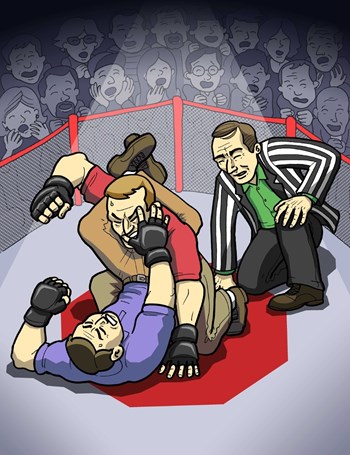
For most people, “foaming at the mouth” is just a figure of speech. Attorney Ellen Hirsch de Haan, a managing partner in the Tampa Bay, Florida office of Becker & Poliakoff PA, has encountered the real thing—and not at an animal shelter, but at a condominium owners’ meeting.
A former president who recently had been voted off the board began pacing angrily between the board table and the assembled unit owners. He got so upset he was literally frothing, Hirsch de Haan says, so she responded by “circling the wagons.”
“I gathered all the board members around the table, and we talked very quietly,” she explains. The man continued to rant and rave. After a few minutes, one of the unit owners piped up and said, “Hey buddy, would you sit down and shut up? We want to hear what’s going on.” The former board member responded by leaving, slamming the door on his way out. “The audience burst into spontaneous applause,” says Hirsch de Haan,
When Frasier Crane, the stuffy, TV psychiatrist played by Kelsey Grammer, ran afoul of his condo board president, much hilarity ensued. But as condo boards and management staff have to deal with increasing levels of anger—both in their day-to-day exchanges and scheduled meetings—it’s not exactly a laughing matter. Knowing how to defuse hostility and taking steps to prevent it in the first place are both talents that every board should have in its skill set.
Rising Tensions
As last summer’s town hall meetings on health care demonstrated so vividly, amped-up tensions are hardly exclusive to co-op or condo board meetings. The decline in civility in America has been widely lamented for at least the past decade, and has been in the works for much longer, according to P.M. Forni, a professor and cofounder of the Civility Project at Johns Hopkins University. In an article that appeared last fall in the American Association of Retired Persons AARP Bulletin Today, Forni lays the blame for much of today's pervasive rudeness and quick tempers to post-Baby Boomers' overdeveloped sense of entitlement, but also to the sense of detachment our reliance on electronic communication and mass media has wrought.
“The Internet has depersonalized our relationships,” says Forni. “We email, instant-message and make anonymous comments online. We react quickly and don’t censor ourselves. We live in a time when anyone can say anything about anybody. The shrillest voices are the ones that get the most attention. We shout our opinions because the media seems to tell us that’s the way to be heard. Pundits screaming at one another—this is part of our everyday life. We see this as normal and acceptable.”
Add to the cacophony a still-shuddering U.S. economy that has landed more and more shareholder/owners in financial distress, and it becomes ever more important for board members and property managers to develop strategies to defuse tensions and deal effectively with stressed-out, frustrated, or angry owners.
“This has been a gradually growing trend,” says Hirsch de Haan, who also writes books on community association issues and teaches classes on handling difficult people. “When I started doing meetings, I would have one bad meeting a year. Now, I’d say if I have one good one, it’s nice. There is a very definite drop in civility.... People feel comfortable being unspeakably rude to total strangers. You see it at the supermarket. You see it on the road. You saw it in the town meetings on health care.”
And while it may not be the primary cause of rudeness, the economy has exacerbated matters. “A lot of the tension is related to the economic cycle—a lot of people are unable to meet their monthly obligations,” said Jasmine Martirossian, PhD, an author and social psychologist at Northeastern University in Boston. “How associations handle the situation can be a big deal. Bringing a modicum of humanity brings a world of difference.... I don’t think anybody moves into condominium association with the express desire to be bad. No one’s trying to be horrible board member or a horrible neighbor.”
Kitchen Timers
Want a simple tool that can increase civility at your next board meeting or annual meeting? Try a kitchen timer. Give everyone two minutes to speak, and then move on—politely. This goes a long way toward cutting short angry soliloquies and prevents one person from monopolizing the meeting.
If you know you have a contentious group or a controversial topic to address, it may be wise to simply not give the audience a microphone. That doesn't mean depriving them of a voice—you can have them write down their questions or concerns, then have a board member repeat them to the assemblage. Regardless of your approach, the experts advise keeping the tone of meetings as formal and polite as possible, and running them in strict accordance with Robert's Rules of Order.
If you aren't comfortable running a formal meeting, you might even consider bringing in a professional to assist you. Most larger cities have parliamentarian organizations that can offer help.
But above all, says Hirsch de Haan, board members must not allow themselves to be drawn into an angry confrontation—no matter how tempting. If you refuse to react to someone's bad behavior, it’s much easier to defuse a tense situation. “If somebody’s yelling and you speak quietly, it tends to calm them down,” she says.
Whatever you do, make sure business carries on as usual. “What you don’t want to do is adjourn the meeting,” says Hirsch de Haan. By doing so, “you have rewarded their bad behavior. They’ve won—and they'll do it again. Plus, you don't get your business done, and that's what you're there for to begin with.”
Some boards dealing with long-running, especially divisive issues have even gone so far as to hire outside security for meetings they feel may become explosive—though the practice is extremely rare. “If you’ve got an extreme situation, you can hire an off-duty police officer or sheriff’s deputy,” advises Hirsch de Haan, who says that up to two years ago, she’d had to hire security just three times in 25 years. “Last year, I had a sheriff’s deputy at five meetings,” she says, “and one time, he actually had to intervene.”
The Winter of our Discontent
Part of the problem, says Martirossian, is that people don’t necessarily have a background in governance when they’re elected to a condo board. So, they may lack the necessary communication skills. For example, springing a special assessment on owners without carefully laying out the reasons over time is a surefire recipe for discontent—especially in an economy where the jobless rate is above 10 percent. Martirossian also doesn’t believe in following the rules robotically—instead, she advocates making sure that individuals are treated with empathy. “Empathy” doesn't equal sending your building or condominium association into bankruptcy, however. “It’s a balancing act,” she says.
Alternative Dispute Resolution
In some instances where an argument or issue carries on after the meeting is over with, a board might consider employing Alternative Dispute Resolution (ADR), to settle the issue through third-party mediation or arbitration.
According to the Association of the Bar of the City of New York, ADR is “a voluntary approach to settling disputes instead of going to court. A neutral person—a trained mediator—facilitates negotiations between participants in reaching a mutually acceptable resolution to their dispute.”
The New York City Bar has even established the “Co-op and Condo Mediation Project,” a program designed to help shareholders, managing agents, boards of directors, and others settle residential disputes without drag-down fights or drawn-out court hearings. The service is available in situations where all parties to a dispute are prepared to seek mediation. Industry sources say that on average, ADR services are around 75 percent cheaper than court costs, and mediation sessions can be arranged in a matter of days or weeks, rather than the years it can take a court date, much less a judgment.
“Although the program is not designed or intended to resolve all such disputes, it is ideal for what are essentially quality of life disputes that, for lack of a quick resolution, too often escalate into lengthy and contentious litigation,” according to bar association member Michael T. Manzi, who is with the Manhattan law firm of Balber Pickard Maldonado & Van Der Tuin, PC.
The Co-op and Condo Mediation Project is a joint effort by two New York City Bar committees—the Cooperative and Condominium Law Committee and the Alternative Dispute Resolution Committee. “Neighbors may find themselves involved in conflict over any number of concerns, including the need for quiet or the use of common space,” said Dan Weitz, chair of the association’s ADR committee. “This special program offers neighbors (and the boards they often ask to intervene) a fast, inexpensive and confidential process through which to achieve durable solutions to their conflict.”
If the problem involves personality rather than legal conflicts, the professionals say that a board may have to handle it themselves. For example, if owners are routinely belligerent to property management staff, it may be time to reduce office hours. If inboxes are being filled with angry e-mails, create an association e-mail and require that all communication be routed there to be considered official. That can also cut down on abusive phone calls to staff.
Patience is a Virtue
Patience can also be key in restoring harmony. “One time, I mediated a conflict out in California where the original parties had moved out of the association, but the conflict had outlived them,” says Martirossian. “The people there didn’t really know how it got started. But when you bought into the condominium, you immediately had to take sides. By the time I came to the conflict, it had been brewing for seven years.”
Relations had become so strained that every member of board had been arrested at least once: One faction would host meetings—which were supposed to be open to all owners—in their home. Members of the other faction would try to attend, and the host would call the police and have them arrested for trespassing.
It took 18 months of “slow work” to resolve the situation. “Everything was a conflict,” Martirossian continues. For example, a sauna needed repair. A former board member, a mechanical engineer, thought he could fix it and save the association $5,000. The current board opposed the idea, and it led to “a meltdown.”
She resolved the situation by suggesting a bet: The engineer offered to take the board president out to a fancy restaurant if he couldn't fix the sauna. The president replied, 'Go for it.' It was an unorthodox approach … but it moved them a long way” toward repairing the relationship, says Martirossian. (As it turned out, he was able to repair the sauna.)
The issue of dealing constructively with anger and frustration comes down to more than just getting through your annual building meeting without coming to blows, says Forni. “If we cannot be civil, our quality of life deteriorates, society itself begins to fray and democracy is weakened,” he says. “We get to the point where incivility escalates and crosses into violence. We all have an incentive to foster civility because the higher the level of civility, the lower the level of violence in a society.”
Martirossian agrees. “Looking at neighbors as enemies is very taxing on people’s psyches,” she says. “Building peace is critical.”
Yvonne Zipp is a freelance writer and a frequent contributor to The Cooperator.






4 Comments
Leave a Comment